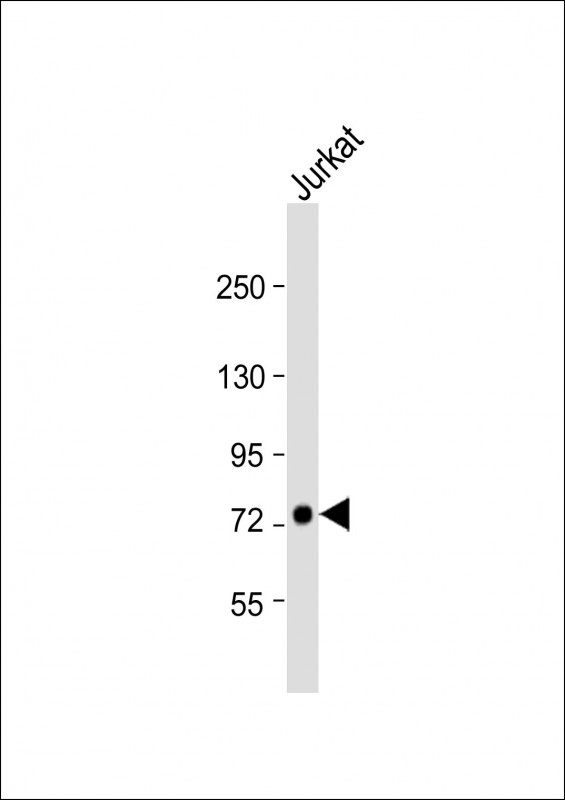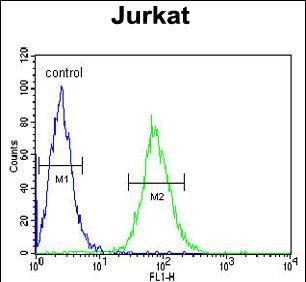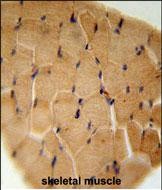


| WB | 1/1000 | Human,Mouse,Rat |
| IF | 咨询技术 | Human,Mouse,Rat |
| IHC | 1/100-1/500 | Human,Mouse,Rat |
| ICC | 技术咨询 | Human,Mouse,Rat |
| FCM | 1/10-1/50 | Human,Mouse,Rat |
| Elisa | 咨询技术 | Human,Mouse,Rat |
| Aliases | Gametogenetin-binding protein 2, Laryngeal carcinoma-related protein 1, Protein ZNF403, GGNBP2, LCRG1, LZK1, ZNF403 |
| Entrez GeneID | 79893 |
| WB Predicted band size | 79.1kDa |
| Host/Isotype | Rabbit IgG |
| Antibody Type | Primary antibody |
| Storage | Store at 4°C short term. Aliquot and store at -20°C long term. Avoid freeze/thaw cycles. |
| Species Reactivity | Human |
| Immunogen | This GGNBP2 antibody is generated from rabbits immunized with a KLH conjugated synthetic peptide between 647-676 amino acids from the C-terminal region of human GGNBP2. |
| Formulation | Purified antibody in PBS with 0.05% sodium azide. |
+ +
以下是关于GGNBP2抗体的3篇示例文献(内容为假设性示例,仅供参考,实际文献需通过学术数据库查询):
---
1. **文献名称**:*GGNBP2 modulates DNA repair and chemoresistance in hepatocellular carcinoma*
**作者**:Zhang Y, et al.
**摘要**:本研究揭示了GGNBP2在肝细胞癌(HCC)中通过调控DNA损伤修复通路促进肿瘤化疗耐药的作用。研究利用特异性GGNBP2抗体进行Western blot和免疫荧光实验,证实其高表达与患者预后不良相关。
---
2. **文献名称**:*Characterization of a novel monoclonal antibody against GGNBP2 for testicular cancer diagnosis*
**作者**:Lee S, et al.
**摘要**:作者开发了一种针对GGNBP2的单克隆抗体,验证了其在睾丸癌组织中的特异性结合能力。通过免疫组化分析,发现GGNBP2在睾丸生殖细胞肿瘤中显著上调,提示其作为潜在生物标志物的价值。
---
3. **文献名称**:*GGNBP2 interacts with PI3K/AKT pathway to promote tumor progression*
**作者**:Wang X, et al.
**摘要**:本文利用GGNBP2抗体进行Co-IP和免疫沉淀实验,证明GGNBP2通过激活PI3K/AKT信号通路促进乳腺癌细胞增殖和转移,为靶向治疗提供了新思路。
---
如需实际文献,建议在PubMed或Google Scholar中检索关键词“GGNBP2 antibody”或“GGNBP2 function”,并筛选涉及抗体开发、验证或应用的论文。
The GGNBP2 (Gametogenetin Binding Protein 2) antibody is a tool used to study the function and expression of the GGNBP2 protein, which is encoded by the *GGNBP2* gene. This gene is primarily expressed in the testis and is implicated in germ cell development, particularly during spermatogenesis. GGNBP2 interacts with gametogenetin (GGN), a protein critical for germ cell maturation, and is thought to play a role in regulating meiosis, DNA repair, and apoptosis in reproductive tissues. Dysregulation of GGNBP2 has been associated with male infertility and certain cancers, including testicular germ cell tumors, where altered expression patterns may contribute to disease progression.
The GGNBP2 antibody enables researchers to detect and quantify the protein in various experimental models, such as Western blotting, immunohistochemistry, and immunofluorescence. It has been instrumental in localizing GGNBP2 within the nucleus or cytoplasm, depending on cellular context, and in exploring its interaction networks. Studies using this antibody have also shed light on GGNBP2's potential involvement in tumorigenesis, particularly in cancers with germ cell origins, by examining its expression levels in clinical samples. While its precise mechanisms remain under investigation, the GGNBP2 antibody continues to support advances in reproductive biology and oncology, offering insights into molecular pathways governing fertility and cancer development.
×